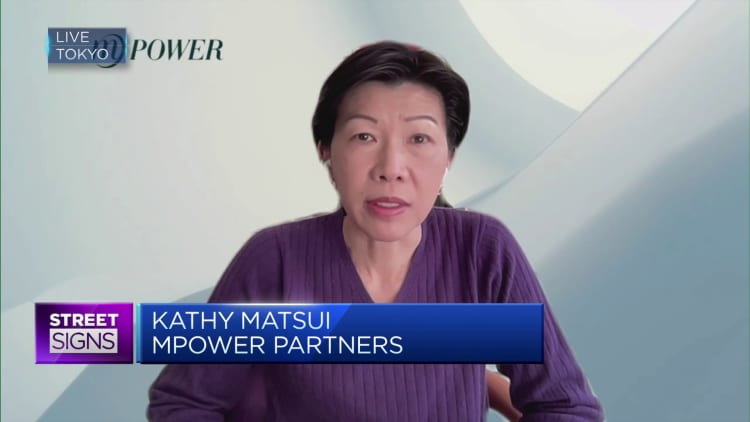Flag of Japan on dark blue background. 3D render
Da-kuk | E+ | Getty Images
Japan is stepping up efforts to ensure its listed companies become more efficient with capital allocation and increase shareholder returns this year.
The operator of Tokyo’s stock exchange will release Monday, its first monthly list of public companies that have shared their plans for optimizing capital management to enhance returns for their investors.
The Japanese government and the TSE also have plans in the works for increasing corporate board independence and female representation.
“It’s not just the Tokyo stock exchange, but the entire Japan government is pushing for better corporate governance right now,” said Toru Yoshikawa, a business professor at Waseda University in Tokyo.
The Tokyo Stock Exchange is entering into its second year of corporate governance reforms, kickstarted in March last year, by directing listed companies whose shares are trading below a price-to-book ratio of one — an indication it may not be using its capital efficiently — to “comply or explain.”
That’s just one part of Prime Minister Fumio Kishida’s broader pledge to transform Japan Inc into an attractive investment proposition for foreigners and Japanese investors.
In a bold move aimed at encouraging its citizens to redirect their savings towards investment, Japan overhauled its Nippon Individual Savings Account (NISA) to make all investments under this program tax exempt for the lifetime of the investor effective this month.
With this move, the onus also falls on Japan’s government to ensure steady and reliable returns from Japan’s companies.
These measures also have implications for Japan’s broader economic agenda such as firms’ wage-setting behavior and the effort to reflate the world’s third-largest economy, which has been mired in deflation for much of the last three decades.
With a rapidly ageing population, the country is also keen on its listed companies offering attractive shareholder returns to ensure its people have more to live on than just their regular pensions in their retirement.
“It’s a very critical issue in the future for Japan. Many people do not have enough income to live after retirement,” Yoshikawa said. “The government also wants to attract more foreign investment to create more higher skilled jobs.”
The prospect of meaningful change has revived interest in the Japanese stocks in the past year, with the benchmark Nikkei 225 index soaring to its highest in more than three decades — with many foreign investors taking the lead of legendary investor Warren Buffet and his bullish calls on Japanese equities.
Corporate governance push
Monday’s disclosures will be based on information as of December and the releases will be a monthly affair.
At its last update in October, the Tokyo Stock Exchange said only 31% of 1,235 “prime” listings — the most liquid stocks with the largest market capitalization — and a mere 14% of 887 “standard” listings have responded to its request for reporting their discussions on, and specific measures and timelines for improving the way they manage their capital.
“Delisting or any punishment or any enforcement is quite unlikely, but the good news in Japan is there is the peer pressure factor,” Yunosuke Ikeda, Nomura’s chief equity strategist, told CNBC in June. “If rival companies are doing great improvements in corporate governance, others will tend to follow that move.”

The world’s largest carmaker Toyota Motor is one example.
Along with two other affiliated companies, it announced in late November it would trim its stake in car parts maker Denso to fund more investment in electric vehicles. Toyota also announced in late July it will reduce its stake in telecommunications operator KDDI.
“Our expectation is that continued TSE pressure on corporates to respond to its requests will lead to a further acceleration in corporate governance-related activity amongst listed Japanese companies in 2024,” Goldman Sachs Japan equity strategists said in their 2024 outlook.
“In particular, we believe that investors view company announcements regarding the unwinding of cross-shareholdings as an important indication of corporate governance improvement, and as share prices often react strongly as a result, we think this theme warrants continued attention in 2024,” they added.
Board changes
There are other moves aimed at helping Japan Inc inject more diversity and independence to their boards, while getting Japanese companies to become more responsive to shareholders.
As part of the rules Japan’s government plans to include in listing regulations, the largest listed firms are required to have at least one woman on their respective boards by 2025.
By 2030, Japan aims to have women constitute at least 30% of the directors at major companies, according to draft plans released by Japan’s Gender Equality Bureau in June that are broadly aimed at increasing and empowering female participation in the economy.
In its 2021 revision, the country’s Corporate Governance Code, Japan’s Financial Services Agency mandated for at least a third of the board of listed companies to be independent directors from outside their respective companies.
“We think it is no coincidence that there has been a wave of sweeping capital reshuffling this year,” Bank of America Securities’ Japan equity strategists said in a note last month.
“Stronger disciplinary measure is being taken against companies, and there are indications that, for companies, the meaning of being listed is starting to change,” they wrote.















































